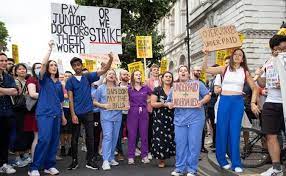Tens of thousands of physicians in England started a four-day strike on Friday amid mounting worries that their contentious pay dispute with the British government will continue into the winter.
Early-career doctors’ fifth round of strikes is expected to continue till Tuesday morning at 7 a.m. Some of the junior physicians on strike recently began their first positions in the National Health Service, which is sponsored by the government.Junior doctors, who perform a large portion of the everyday job in hospitals and put in extremely long hours, are taking action, which will unavoidably increase the backlog in the troubled health system. By the time the doctors return to work, the NHS estimates that 1 million procedures and appointments will have been postponed or rescheduled, at a cost of 1 billion pounds ($1.27 billion).
To bring compensation back to 2008 levels after accounting for inflation, the British Medical Association, which represents the roughly 75,000 junior physicians, has been calling for a 35% pay increase. Prime Minister Rishi Sunak, however, has reiterated there will be no further increases beyond the government’s current promise of 6% with a further consolidated increase.
Sumi Manirajan, a junior physician and the deputy co-chair of the BMA’s U.K. doctor committee, claimed that she regularly encounters colleagues who are “burned out.”
“All we’re asking is for our wages to return to what it was in 2008. The 29-year-old remarked along a picket line outside University College Hospital in north London, “We’re not asking for a pay hike.Manirajan, a junior doctor for three years said, “My friends have left the NHS after a year of service and have gone to Australia.
The government, on the other hand, maintains that their pay offer is reasonable and that complying with the wage demand would further fuel inflation in the U.K. As a government, “we have to be responsible in the pay settlements that we give, and we listened to the Independent Pay Review Body,” Treasury Minister John Glen told Sky News.The United Kingdom has had disruptive strikes as workers, including teachers, train drivers, and nurses, have pushed for pay that maintains pace with a fast rise in consumer prices, like other countries in Europe. The government promised wage raises for millions of public sector employees, including teachers, last month. Teachers were one group that chose to end their protest after the offer was made, which was 6.5% in their instance.
Not only are the junior doctors in the NHS engaged in a salary conflict with the government. Recently, radiographers and senior physicians, or consultants, have also taken their jobs off the table. Nurses, however, have terminated their strike action after a ballot of members failed to receive the necessary number of votes to support another walkout.

















